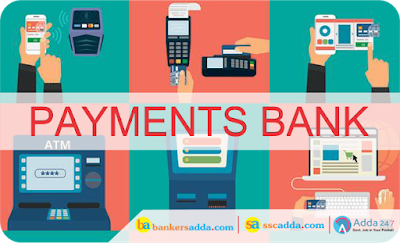Now as the season of Banking exams on its peak, as there are a lot of exams lined up and it becomes really important to aware with all new banking terms, facilities, launches etc. Like payment bank is the new revolution entering into this sector so, it is important to have a knowledge about that as per exam perspective. For the same, we are here with the notes on payment bank which will really help you to clear all your doubts.
Objectives of Payment Banks
The objectives of setting up of payments banks will be to further financial inclusion by providing (i) small savings accounts and (ii) payments/remittance services to migrant labour workforce, low-income households, small businesses, other unorganised sector entities and other users.
Eligible promoters:
Existing non-bank Pre-paid Payment Instrument (PPI) issues; and other entities such as individuals / professionals; Non-Banking Finance Companies (NBFCs), corporate Business Correspondents (BCs), mobile telephone companies, supermarket chains, companies, real sector cooperatives; that are owned and controlled by residents; and public sector entities may apply to set up payments banks.
A promoter/promoter group can have a joint venture with an existing scheduled commercial bank to set up a payments bank. However, scheduled commercial bank can take the equity stake in a payments bank to the extent permitted under Section 19 (2) of the Banking Regulation Act, 1949.
Promoter/promoter groups should be ‘fit and proper’ with a sound track record of professional experience or be running their businesses for at least a period of five years in order to be eligible to promote payments banks.
The scope of activities:
- Acceptance of demand deposits. Payments bank will initially be restricted to holding a maximum balance of Rs. 100,000 per individual customer.
- Issuance of ATM/debit cards. Payments banks, however, cannot issue credit cards.
- Payments and remittance services through various channels.
- BC of another bank, subject to the Reserve Bank guidelines on BCs.
- Distribution of non-risk sharing simple financial products like mutual fund units and insurance products, etc.
Deployment of funds:
- The payments bank cannot undertake lending activities.
- Apart from amounts maintained as Cash Reserve Ratio (CRR) with the Reserve Bank on its outside demand and time liabilities, it will be required to invest minimum 75 per cent of its “demand deposit balances” in Statutory Liquidity Ratio(SLR) eligible Government securities/treasury bills with maturity up to one year and hold maximum 25 per cent in current and time/fixed deposits with other scheduled commercial banks for operational purposes and liquidity management.
Capital requirement:
The minimum paid-up equity capital for payments banks shall be Rs. 100 crore.The payments bank should have a leverage ratio of not less than 3 per cent, i.e., its outside liabilities should not exceed 33.33 times its net worth (paid-up capital and reserves).
Promoter’s contribution:
The promoter’s minimum initial contribution to the paid-up equity capital of such payments bank shall at least be 40 per cent for the first five years from the commencement of its business.
Foreign shareholding: The foreign shareholding in the payments bank would be as per the Foreign Direct Investment (FDI) policy for private sector banks as amended from time to time.
Other conditions:
The operations of the bank should be fully networked and technology driven from the beginning, conforming to generally accepted standards and norms. The bank should have a high powered Customer Grievances Cell to handle customer complaints.
A detailed scrutiny was undertaken by an External Advisory Committee (EAC) under the Chairmanship of Dr Nachiket Mor, Director, Central Board of the Reserve Bank of India. The recommendations of the EAC were an input to an Internal Screening Committee (ISC), consisting of the Governor and the four Deputy Governors. This Internal Screening Committee prepared a final list of recommendations for the Committee of the Central Board (CCB), after independently scrutinising all the applications.
The Reserve Bank of India has granted “in-principle” approval to the following 11 applicants to set up payments banks under the Guidelines for Licensing of Payments Banks issued on November 27, 2014.
1. Aditya Birla Nuvo Limited
2. Airtel M Commerce Services Limited
3. Cholamandalam Distribution Services Limited
4. Department of Posts
5. Fino PayTech Limited
6. National Securities Depository Limited
7. Reliance Industries Limited
8. Shri Dilip Shantilal Shanghvi
9. Shri Vijay Shekhar Sharma
10. Tech Mahindra Limited
11. Vodafone m-pesa Limited





 GA Capsule for SBI Clerk Mains 2025, Dow...
GA Capsule for SBI Clerk Mains 2025, Dow...
 The Hindu Review October 2022: Download ...
The Hindu Review October 2022: Download ...
 Supreme Court JCA Exam Date 2025 Out, 24...
Supreme Court JCA Exam Date 2025 Out, 24...







